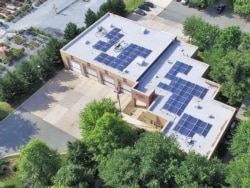While President Joe Biden has issued executive orders aimed at reducing America's carbon footprint, efforts to curb greenhouse gas emissions at the local level have been gaining strength for years, even as the former Trump administration sought to reinvigorate the fossil fuel industry.
Those efforts include a growing number of local governments switching to solar energy to power office buildings and other structures. The initial costs of moving to solar, including installing solar panels, have decreased by 90% over the past decade, often making renewable energy more affordable than using the electric grid which, in many regions, continues to be powered by burning coal.
"For the most part, we've seen a dramatic growth in the solar sector, despite the headwinds that were associated with a less-than-supportive Trump administration," said Gregory Wetstone, president and chief executive of the American Council on Renewable Energy.
"The absence of federal action on climate change" during the past few years actually contributed to the growing trend, explained Tatsatom Gonçalves, an energy research analyst at the World Resources Institute, who wrote an article last year about U.S. cities and counties embracing renewable energy.
The rollback on environmental protections "prompted a lot of local governments to make a commitment to clean energy," including solar, Gonçalves told VOA.
"Municipalities and counties know that solar is the wave of the future," said Warren Leon, executive director of the Clean Energy States Alliance. "They also want to encourage their residents and businesses to install solar. By putting solar on their own buildings, they are leading by example."
That includes Maryland's most populous jurisdiction, Montgomery County, a Washington, D.C., suburb that encompasses 19 municipalities and is home to more than 1 million people.
Christopher Brown, chief of Montgomery County's Office of Energy and Sustainability, said in the past five years, solar panels have been installed atop libraries, recreation centers and a fire station. In deploying the technology, Brown said Montgomery County aims to set an example for other counties and cities about the benefits of solar programs.
That is also true in Peterborough, New Hampshire, according to the town's capital project manager, Rodney Bartlett.
"Peterborough was one of the first communities in New Hampshire to pass a resolution to reduce our carbon footprint," he said, noting that the town's wastewater treatment plant is solar-powered, saving $20,000 in energy costs per year.
Like Montgomery County, Peterborough has a power purchase agreement with a private company that paid for all the solar energy costs upfront, including buying and installing solar modules. Bartlett calls it a win-win situation.
"We buy the power from the company at a rate that saves us money in the long run, and it is less expensive than buying power from our local utility company," he said.
Conversion to solar energy continues to gain steam. Fairfax County, Virginia, will begin putting solar panels on county-owned buildings this year.
"Our policy is to leave no rooftop behind," said Kambiz Agazi, director of the county's Office of Environmental and Energy Coordination.
Despite a flurry of local initiatives, clean energy advocates hope the Biden administration will put the power of the federal government behind a national effort.
"We are at a key moment where municipalities are going to need some help in order to maintain momentum in terms of solar," said Leon of the Clean Energy States Alliance, who added that an extension of solar energy tax credits would keep the momentum going.


